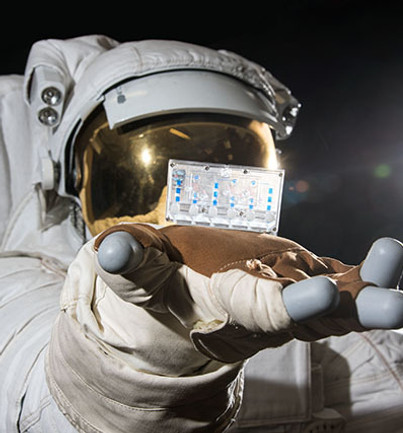Why In-Space Biomanufacturing?
In-space biomanufacturing refines traditional biological processes contributing to advancements in pharmaceuticals and regenerative medicine.

TBD
Developing from Intravenous (IV) to Injectibles
Superior Protein Crystallisation
In microgravity, proteins can form larger and more uniform crystals, facilitating detailed structural analyses crucial for drug design. NASA experiments have consistently validated this effect with larger and higher quality protein crystals grown in space, providing valuable inputs for pharmaceutical advancement.
Improved uniformity and purity not only enhances drug development, but also facilitates the scalable production of therapeutically relevant crystalline formulations, accelerating the development pipeline from research to commercial drug manufacturing.
Improved Biologic Stability
Monoclonal antibodies and enzyme therapies produced in microgravity exhibit enhanced stability and efficacy due to optimised molecular interactions, leading to more effective treatments.

TBD
Supporting Human Exploration Beyond Earth
Efficient Stem Cell Expansion
Microgravity enables stem cells to grow in three-dimensional clusters rather than traditional two-dimensional layers, improving scalability. Research by Cedars-Sinai indicates that stem cell proliferation rates in microgravity could effectively address clinical production bottlenecks.
Cost Reduction
Simplified bioreactor designs, such as XSB-1, suitable for microgravity conditions, can reduce contamination risks and eliminate the need for complex equipment, lowering biomanufacturing costs.

TBD
Optimised Fermentation
Fermentation processes benefit substantially from the uniform environment provided by microgravity. Without gravitational effects, cell cultures experience improved distribution of nutrients, gases, and metabolic by-products, leading to increased cellular productivity and purity.
Specialised bioreactors engineered for microgravity, such as Frontier Space's XSB-1, capitalise on these advantages by incorporating simplified fluid dynamics, reduced contamination risks, and lower reliance on mechanical stirring systems.
This streamlined approach not only enhances fermentation efficiency and product yield, but also reduces equipment complexity and maintenance; key considerations for commercial-scale pharmaceutical production both in space and on Earth.

TBD
Stem Cells – Enhanced Stemness and Pluripotency
Maintenance of Undifferentiated State
Microgravity has been shown to inhibit differentiation in embryonic stem cells (ESCs) and induced pluripotent stem cells (iPSCs), preserving their ability to develop into various cell types. For instance, studies indicate that ESCs cultured in microgravity conditions retain their undifferentiated state more effectively.
Improved Reprogramming
Experiments conducted in the International Space Station demonstrated that fibroblasts reprogrammed into iPSCs in microgravity exhibit higher pluripotency, enhancing their versatility for therapeutic applications.
Explore the future of biomanufacturing in space - join us in shaping the future healthcare innovation.